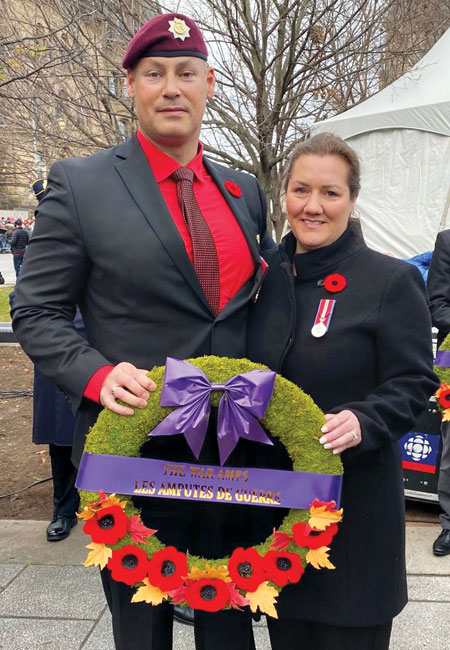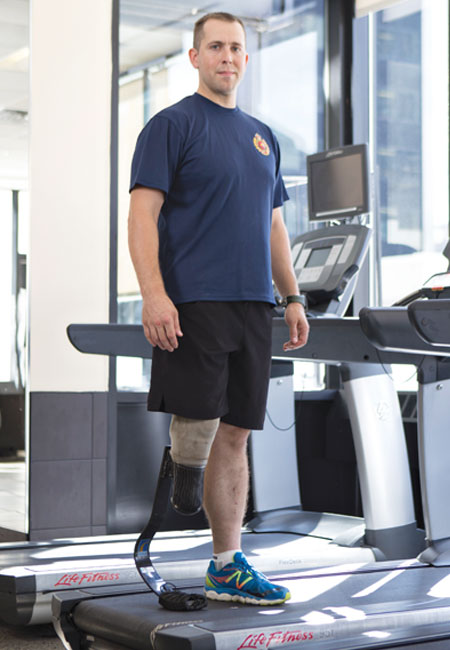Our Work for Veterans

Master Cpl. (Ret’d) Mike, a war amputee veteran, and his wife, Leah, laid a wreath at the 2022 National Remembrance Day ceremony.
The War Amps continues to be the leader in advocating for veterans’ rights and legislation, as well as the driving force behind the National Council of Veteran Associations in Canada (NCVA). With more than 100 years of experience in this area, we are
represented on four of the six ministerial advisory groups of Veterans Affairs Canada (VAC), co-chairing two of these advisory committees.
In 2022, we continued our ongoing fight for veterans dealing with lengthy wait times when applying for disability pensions and health-care benefits, as well as other areas in which we have been outspoken advocates for many years, such as a “one veteran,
one standard” approach for pensions, family and caregiver benefits, and having the issue of marriage after 60 adequately addressed.
Funding ground-breaking research into veterans’ health
In November, we announced an exciting collaboration with the renowned Canadian Institute for Military and Veteran Health Research (CIMVHR) to fund much-needed research on the health-care needs of seriously disabled veterans, for which The War Amps agreed
to provide $500,000 in funding.
By providing these grants, our goal is to address the noticeable lack of research funding for health-related issues that war amputees and seriously disabled veterans face, ensuring that they receive access to the highest level of care and expertise.
We collaborated with CIMVHR and their network of world-class academic researchers to make this a reality. Some of these vital health-care research projects include exploring cutting-edge advances in artificial limb technology and investigating how innovations
in surgical procedures like osseointegration have the potential to transform the mobility of military leg amputees.
The War Amps is looking forward to the important research that will come out of these projects in the near future and seeing the positive impact it will have on Canada’s seriously disabled veterans.
Addressing the VAC disability wait-time crisis

Afghanistan war amputee Maj. Blaise
There is no doubt that the overriding concern in the veterans’ community today remains the intolerable backlog and wait times confronting veterans making applications for disability pensions and health-care benefits, which can take over a year. Throughout
the pandemic, which caused further delays, we have fought for “systemic” change to resolve this issue. We have made numerous submissions to the Minister of Veterans Affairs and senior VAC officials, as well as communicated with the media,
to bring attention to this crisis affecting our country’s disabled veterans.

Afghanistan war amputee Maj. Blaise
It remains our contention in relation to this ongoing administrative crisis that the department should adopt the position that veterans’ claims be considered at face value and be based on the reasonable evidence provided by the veteran and their family,
with the proviso that individual files could be monitored over time and “spot audits” carried out to address any potential abuses. The clear reality that the medical reports usually required by VAC to support these applications continue
to be difficult to obtain at this time must be recognized when considering this issue.
While the Standing Committee on Veterans Affairs released a report in late 2020 accepting the majority of The War Amps and the NCVA’s recommendations to relieve this crisis, in the years since, it is clear that meaningful progress has not been made, and
VAC’s measures to increase staffing and digital resources will not be sufficient on their own.
We are not alone in thinking this; this sentiment was underlined by not only the recent Auditor General’s report of May 2022 but also by the Parliamentary Budget Officer’s report of September 2020.
The Auditor General, Karen Hogan, tabled a report in Parliament on May 31, 2022, concluding that Canada’s disabled veterans continue to face intolerably long wait times and an unacceptable backlog in earning entitlement for deserved
financial assistance and benefits from VAC.
Hogan stated in her press conference that she was unimpressed with the efforts made by the department over the last number of years and called for the prioritization of a “realistic plan” to finally ensure that disabled veterans are not forced to wait
months or even years for the financial support and compensation they need.
We urge VAC to fully recognize the substantive findings and criticisms of the Auditor General’s report and implement with the highest priority the statutory, regulatory and policy changes proposed in the report to create a more immediate resolution
for veterans and their families, who are often facing severe financial insecurity.
A step forward for veterans’ mental health
As of April 1, 2022, veterans who are in need of mental health support while waiting for their benefits applications to be adjudicated can now seek care without delay. While this amendment to the Veterans Health Care Regulations does
not entirely adopt our stance on automatic entitlement, it does provide a significant step forward in recognizing the need for urgency in granting immediate treatment benefits for mental health conditions.
We will continue to advocate in this regard, with this positive development acting as a potential springboard to expanding this principle so that veterans with any form of serious disability are not left waiting for health-care and
treatment benefits.
Calling for “one veteran, one standard” for military pensions
The War Amps and the NCVA continue to advocate for improvements to existing veterans legislation, particularly so with respect to the Pension for Life (PFL) provisions originally announced in December 2017 and formally implemented on April
1, 2019. It is clear that these new benefits under PFL have limited applicability for the majority of seriously disabled veterans – indeed, some are actually worse off.
As stated in our many submissions to VAC and Parliament, the Government has not met veterans’ expectations with regard to the commitment to “re-establish lifelong pensions” to ensure that a comparable level of financial security is provided
to all disabled veterans throughout their life, regardless of where or when they were injured.
We believe it is totally unacceptable that there continues to be legislation in Canada that provides a significantly higher level of compensation to a veteran who was injured prior to 2006 (those covered under the Pension Act) when compared
to a veteran who is injured post-2006 (those covered under the New Veterans Charter/Veterans Well-being Act [NVC/VWA]). If applied to the Afghanistan conflict, this discrimination results in veterans of the same war having drastically different pension benefits.
We urge VAC, working together with relevant ministerial advisory groups and other veteran stakeholders, to create a comprehensive pension/wellness program model that would essentially treat all veterans with parallel disabilities in the same
manner, regardless of when or where they were injured. It has been our longstanding recommendation that the department should use a combination of the best parts of both Acts to provide a better compensation/wellness model for all disabled
veterans in Canada.
Support for families and caregivers of veterans
Since the enactment of the NVC/VWA in 2006, The War Amps and the NCVA have taken the strong position that the federal government has not addressed the plight of families of veterans, particularly in cases where a member of the family, often
a spouse, is required to act in the role of caregiver to a disabled veteran.
Currently, the Caregiver Recognition Benefit provides only $13,000 of non-taxable support per year to a caregiver. This program is clearly inadequate, as it fails to provide appropriate support for caregivers who often have to leave their employment to care for their veteran family member.
In 2021, we made a formal submission to the Standing Committee on Veterans Affairs with important recommendations that were adopted by the committee to ensure caregivers are properly compensated for their work. We strongly believe VAC
should adopt our longstanding recommendations, including incorporating the eligibility standards of the Attendance Allowance (AA) and the amount of allowance in the Department of National Defence’s Attendant Care Benefit into the NVC/VWA,
which has been supported by the committee. We also recommend creating distinct grade levels of compensation for this newly created AA, as well as fine-tuning the concept of allowance given to informal caregivers to recognize their effort
and economic loss.
We remain adamant that the Government should follow a “one veteran, one standard” approach by adopting a comprehensive program model for all veterans and their caregivers, thereby resulting in the elimination of artificial cut‑off dates that
arbitrarily distinguish veterans and their caregivers based on whether the veteran was injured before or after 2006.
Advocating against the “marriage after 60” clause
For more than 25 years, The War Amps and the NCVA have made submissions to the Government in relation to our concerns about the infamous “marriage after 60” clause affecting Canadian Armed Forces retirees. Currently, retirees contribute to
the Canadian Forces Superannuation account throughout their career and one of the important benefits is a 50 per cent Survivor’s Benefit, except when the retiree marries after age 60. To provide their new spouses a Survivor’s Benefit,
veterans over 60 must reduce their own account commensurately.
The resulting financial impact on veterans over the age of 60 and their new spouses is often quite distressing. Over the last 20 years, various governments have made unfulfilled promises to the veterans’ community to eliminate this
clause, including in a 2019 federal budget provision. Unfortunately, the clause still stands.
We believe that it is long overdue for the Government to implement the excellent recommendations brought forward by the Standing Committee on Veterans Affairs, which call for the elimination of this clause and the immediate implementation
of the Veterans Survivors Fund. We will continue this longstanding fight for veterans; after so many years of tortuous advocacy, they deserve nothing less.